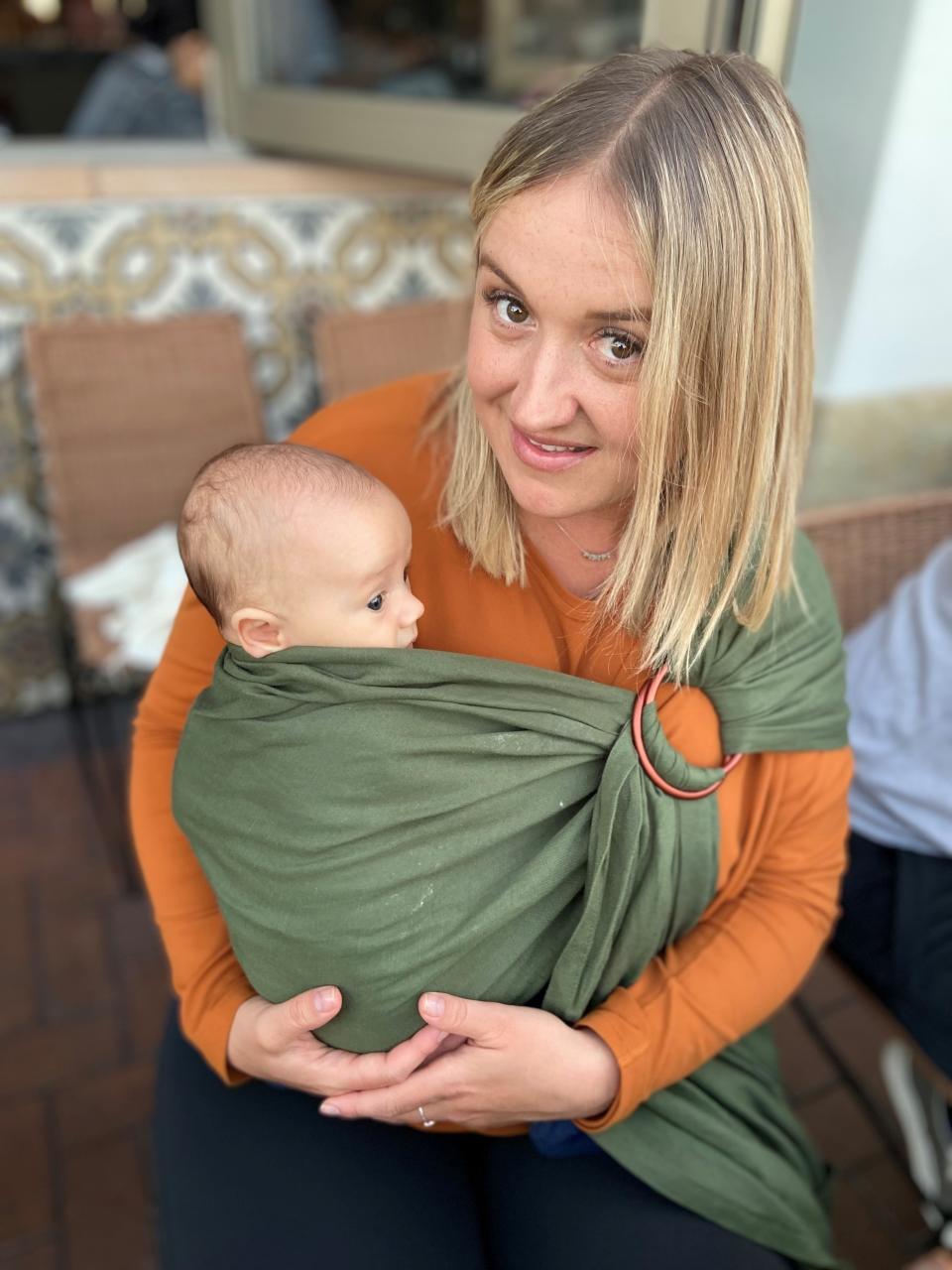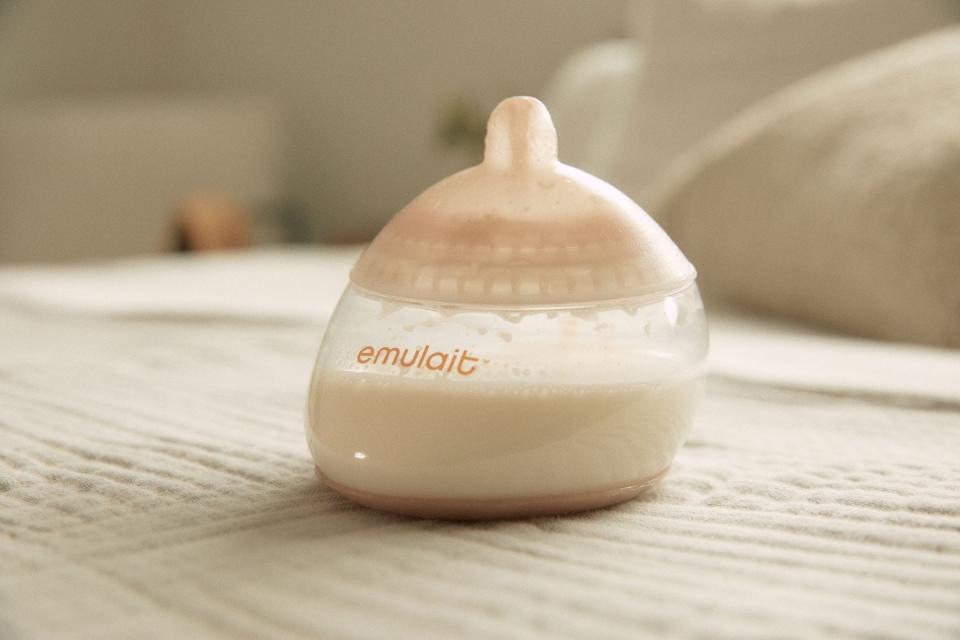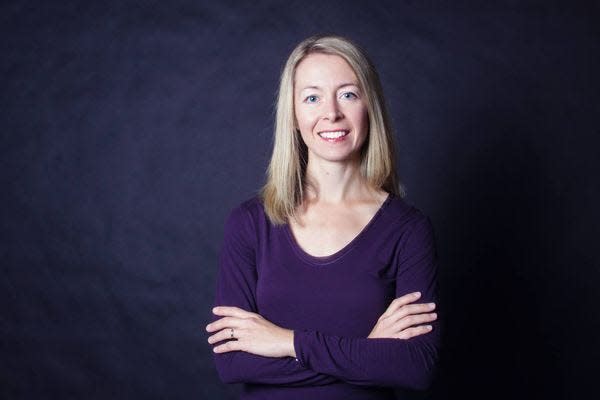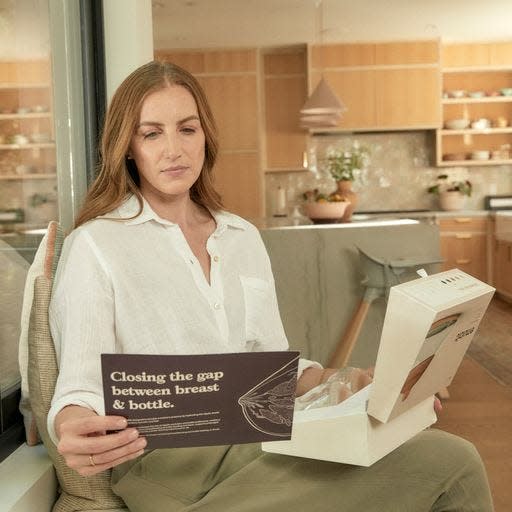Baby bottle company claims to have a fix for breast feeding woes. They're emulating the experience.
When Veronica Nolan sold a Range Rover last year to the owner of a California startup that makes breastfeeding baby bottles, she was intrigued by the company's business concept.
Nolan, a car-sales representative who lives in Carlsbad, California, was told the company used digital scans of a person's breasts through a phone app to create a baby bottle lid that replicated the breasts' shape, size and color, to encourage bottle feeding.
She planned to breastfeed her baby and "never thought I would need anything" that the company, called Emulait, had to offer.
Fast forward to April.

That's when Nolan said she was on the phone getting more information about the company when her son, James Leo, was having trouble latching to her breast because he had severe tongue-tie, a condition that limits the use of a tongue, and lip tie, where the upper lip cannot be curled or moved normally. That forced her to use a syringe to feed him.
"As it turns out, I really needed it," she told USA TODAY in early November. "Before, he would just scream and cry, ... This product has really helped me."
Nolan, 39, said she thought she would be a bit "shy" to take a scan of her breast to give measurements for the bottle top. But "after having a baby, nothing phases you."
She was among the first to use the company's technology, according to Emulait.

Nolan said the Emulait bottle, which the company says will be available for online sales in January, allowed her to easily transition back and forth from breast to bottle feeding.
Strong competitors
Emulait is entering a growing and competitive market for breastfeeding baby bottles, according to Dr. Amy Roskin, a board-certified OB/GYN and chief medical officer of New York-based Seven Starling, which offers online care for maternal mental health.
"There are a number of companies with successful products already in the space. Differentiation is going to be important," she said in an interview.
Dr. Jessica Madden, a board-certified pediatrician and neonatologist currently on staff in the neonatal intensive care unit (NICU) at Rainbow Babies and Children's Hospital in Cleveland, agrees that the market is competitive, but she's intrigued by what Emulait has to offer.
Madden, also medical director at Aeroflow Breastpumps, a durable medical equipment provider, said parents are looking to be able to successfully bottle feed babies who have been breastfed.
Madden said there are numerous companies during the last five to 10 years that have tried to create baby bottles that are similar to a nursing person's nipple.

Emulait officials acknowledge that they have strong competition with established companies like Dr. Brown's, Comotomo, Nanobébé and mimijumi that sell breastfeeding baby bottles. Forbes in June rated Comotomo baby bottles as the best for breastfed babies.
Yet, the U.S. market for baby bottles is in the low billions of dollars and growing, according to several consumer research companies.
IMARC Group, a global market research company, expects the U.S. baby bottle market to reach $3.6 billion by 2027, and it attributes some of the growth to manufacturers developing "premium quality, medical-grade silicone feeding bottles with offset nipples to promote latching and minimize bottle rejection."
"Getting a baby to take a bottle can be a challenge, so innovations that ease this transition would be very helpful," Roskin said.
Shilo Ben Zeev, an Israeli entrepreneur who bought the vehicle from Nolan, is hoping other parents will purchase his baby bottle that he said took one-and-half years to develop.

He said the company, based in Santa Monica, California, came about after his daughter, Amalia, had trouble latching as a baby to her mom, Tamar.
"This is going to change the lives of mothers and families," said Zeev, who also co-founded LabStyle Innovation, which produced a glucose meter that connects to mobile devices.
Emulait officials say they plan to appeal not only to mothers but also to fathers and caretakers with babies, including those latch issues and medical conditions like tongue-tie.
How it works
Avishag Ravid, Emulait's chief operating and marketing officer, said the Emulait bottle is designed to copy the nipple, areola and breast in function and feel. The bottles also have three different flow levels for drinking, and the company has a scientific advisory board that includes an infant feeding expert.

Ravid said the app will digitally scan breasts to create one of 25 bottle top variations with five different colors ranging from "fair" to "rich" and the five most common sizes. The bottle tops will be made in Ossian, Indiana, about 115 miles northeast of Indianapolis.
Ravid said no humans ever will see the scan of the breast because only data points will be captured, and the process will be similar to using a facial scan on a smartphone or laptop.
She said women for years have purchased clothes and bras online, and she believes mothers will be comfortable buying tailor-made breast-shaped baby bottles.
The company's starter kit is $55, and it includes two nipples, one anatomy bottle, one classic bottle, three-flow control system, a cleaning brush, travel pouch and a complimentary 30-minute virtual consultation with a certified lactation consultant.
As for rivals, Nanobébé's starter set that includes four bottles, a non-electric warming bowl, two pacifiers, two breast pump adapters, four slow-flow silicone nipples, covers and storage caps sells for $39.99. Comotomo's starter set includes four bottles and a pack of slow-flow, medium-flow and fast-flow replacement nipples for $59.99.
Roskin said the pricing seems competitive because it includes a baby feeding consultation.
Meanwhile, a typical silicon baby bottle sells for between $3 and $4 at CVS.
Emulait's long-term plan is to work with insurance carriers. For those who cannot afford the kit, the company has a donation program and flexible payment plan. It currently is not covered by the federal Supplemental Nutrition Assistance Program (SNAP), and it's initially only going to be sold online.
Have a tip on business or investigative stories? Reach the reporter at craig.harris@usatoday.com or 602-509-3613 or on Twitter @CraigHarrisUSAT or linkedin.com/in/craig-harris-70024030/
This article originally appeared on USA TODAY: Baby bottle startup Emulait says it has a fix for breast feeding woes
